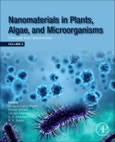Nanomaterials in Plants, Algae and Microorganisms: Concepts and Controversies: Volume 2 not only covers all the new technologies used in the synthesis of nanoparticles, it also tests their response on plants, algae and micro-organisms in aquatic ecosystems. Unlike most works in the field, the book doesn't focus exclusively on the higher organisms. Instead, it explores the smaller life forms on which they feed. Topics include the impacts of plant development, how different nanoparticles are absorbed by biota, the impact different metals-including silver and rare earth metals-have on living organisms, and the effects nanoparticles have on aquatic ecosystems as a whole.
As nanotechnology based products have become a trillion-dollar industry, there is a need to understand the implications to the health of our biota and ecosystems as the earth is increasingly inundated with these materials.
Please Note: This is an On Demand product, delivery may take up to 11 working days after payment has been received.
Table of Contents
1. Harmful phytotoxic characters of cobalt and zinc oxide nanoparticles in Algae 2. Response of nanoparticles on aquatic ecosystem 3. Nanoparticle and Algae Interactions: Oxidative termination, reactive oxygen species generation and synergistic toxic impacts 4. Nanoparticles: Sources and Responses 5. Response of nanoparticles on molecular mechanisms of aquatic plants and algae 6. Ecotoxic effect of photocatalytic active nanoparticles on algae and aquatic plants 7. Nanoparticles: Antifungal and Antimicrobial responses 8. A comparative behavior of metals and oxide Nanoparticles on aquatic plants, microbes and algae 9. Impact of nanoparticles on genomics of living organisms 10. Physiology, Chemistry and Biochemistry of Nanoparticles 11. Phytotoxicity of silver nanoparticles to aquatic plants, algae and microorganisms 12. Zinc oxide nanoparticles' impact on aquatic plants, algae and microorganisms 13. Do nanoparticles possess ecotoxicological risks to the aquatic environment? 14. Availability, behavior and impact of nanoparticles in the environment 15. Ecotoxicology of carbon-based engineered nanoparticles on plants and aquatic ecosystems 16. Uptake and translocation of nanoparticles in wetland plants 17. Relevance of wetland plants in the synthesis of nanoparticles 18. Toxicity assessment of cerium oxide nanoparticles in wetland plants 19. Behavior of nanoparticles on aquatic foods and vegetables 20. Genotoxicity of silver nanoparticles in wetland plants and algae 21. Changes in gene expression of algae and aquatic plants in response to nanoparticles and ions








